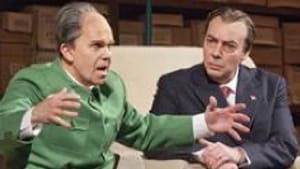Stay in the Loop
BSR publishes on a weekly schedule, with an email newsletter every Wednesday and Thursday morning. There’s no paywall, and subscribing is always free.
A cable-news opera
"Nixon in China' at the Met

Like many American GIs who served in the pacific during World War II, Richard Nixon was emotionally invested in China's Generalissimo Chiang Kai-Shek. He subsequently found political success when he attacked Democrats for selling out Chiang and "losing" China to the Communists. When he played the "China card," American voters elected him to Congress, then the Senate, then the vice-presidency and ultimately the White House. Yet in 1972 Nixon turned his back on everything he'd previously stood for, flying to China to shake hands with the devil— in this case, Mao Tse-Tung.
Here, it would seem, is terrific raw material for an opera—not about murder or sexual intrigue, but about the inner psychological conflict of a leader who rejects his own professed principles.
Unfortunately, Nixon in China offers nothing of the sort. The Met's debut production of the 1987 John Adams opera contains mesmerizing tunes and excellent musical craftsmanship. Its libretto, however, lacks human drama and emotion; it's more of a documentary than an opera.
The opera's creators, speaking at intermission of the Met's HD transmission to movie theaters, stressed the great care they took to study documents and photos and make sure they got things "right." But that's precisely the problem with Nixon in China.
The creators of past masterpieces based on history, such as Don Carlo and Simon Boccanegra, gave low priority to accuracy. Pushkin paid no heed to how Boris Godunov actually sounded, and Boito didn't give a damn about the way Simon Boccanegra really spoke.
Like a court transcript
In contrast, Nixon in China provides very little beyond what you've already seen in TV documentaries. It's a cable-news opera with additional commentary in purple-toned poetry. The lyrics of Nixon in China, by Alice Goodman, sound like a court reporter's transcript, albeit embellished with high-flown poeticisms.
Don Carlo wouldn't be a classic if it merely documented the political issues during the reign of Spain's King Philip. Nor would Boris Godunov if it only concerned Russia's foreign relations.
In place of action, Nixon in China offers a succession of set pieces with mesmerizing melodies, plus a ballet in which the characters interact, sort of like "The Small House of Uncle Thomas" from The King and I. Some personal drama exists because Chou En-Lai is sick and Mao is tottering, but nothing similar benefits Nixon.
Poetic Pat?
Instead of context and emotion, Alice Goodman's libretto too often resorts to stenography or to elliptical locutions, as when Pat Nixon sings: "The night is young, unwinding toward my dreams." Goodman is a poet, and apparently that's the way she talks. But her style is elevated beyond comprehension.
John Adams's music is good enough to hear again, and Mark Morris's choreography is stunning. But Nixon in China fails to fulfill the potential of musical drama. It's more like a fading scrapbook full of snapshots with flowery captions.♦
To read a response, click here.
Here, it would seem, is terrific raw material for an opera—not about murder or sexual intrigue, but about the inner psychological conflict of a leader who rejects his own professed principles.
Unfortunately, Nixon in China offers nothing of the sort. The Met's debut production of the 1987 John Adams opera contains mesmerizing tunes and excellent musical craftsmanship. Its libretto, however, lacks human drama and emotion; it's more of a documentary than an opera.
The opera's creators, speaking at intermission of the Met's HD transmission to movie theaters, stressed the great care they took to study documents and photos and make sure they got things "right." But that's precisely the problem with Nixon in China.
The creators of past masterpieces based on history, such as Don Carlo and Simon Boccanegra, gave low priority to accuracy. Pushkin paid no heed to how Boris Godunov actually sounded, and Boito didn't give a damn about the way Simon Boccanegra really spoke.
Like a court transcript
In contrast, Nixon in China provides very little beyond what you've already seen in TV documentaries. It's a cable-news opera with additional commentary in purple-toned poetry. The lyrics of Nixon in China, by Alice Goodman, sound like a court reporter's transcript, albeit embellished with high-flown poeticisms.
Don Carlo wouldn't be a classic if it merely documented the political issues during the reign of Spain's King Philip. Nor would Boris Godunov if it only concerned Russia's foreign relations.
In place of action, Nixon in China offers a succession of set pieces with mesmerizing melodies, plus a ballet in which the characters interact, sort of like "The Small House of Uncle Thomas" from The King and I. Some personal drama exists because Chou En-Lai is sick and Mao is tottering, but nothing similar benefits Nixon.
Poetic Pat?
Instead of context and emotion, Alice Goodman's libretto too often resorts to stenography or to elliptical locutions, as when Pat Nixon sings: "The night is young, unwinding toward my dreams." Goodman is a poet, and apparently that's the way she talks. But her style is elevated beyond comprehension.
John Adams's music is good enough to hear again, and Mark Morris's choreography is stunning. But Nixon in China fails to fulfill the potential of musical drama. It's more like a fading scrapbook full of snapshots with flowery captions.♦
To read a response, click here.
What, When, Where
Nixon in China. Opera by John Adams; libretto by Alice Goodman; directed by Peter Sellars; choreography by Mark Morris. Through February 19, 2011 at Metropolitan Opera House, Lincoln Center, New York. Seen February 12. HD transmission to movie theaters on March 2, 2011. www.metoperafamily.org.
Sign up for our newsletter
All of the week's new articles, all in one place. Sign up for the free weekly BSR newsletters, and don't miss a conversation.

 Steve Cohen
Steve Cohen